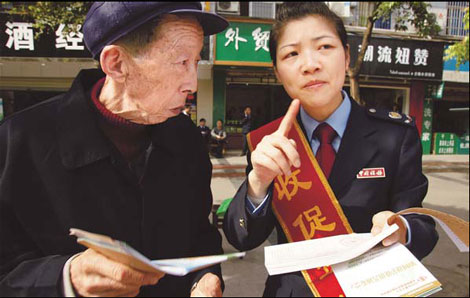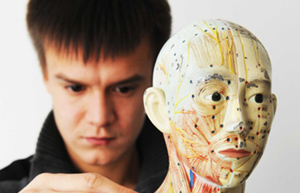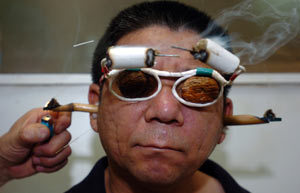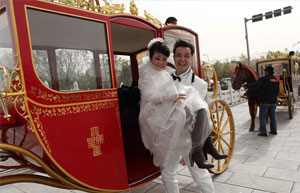Govt vows to improve local tax system
Updated: 2010-11-19 09:26
By Wang Xiaotian (China Daily)
An official from the State Administration of Taxation talks with a man in Guang'an, Sichuan province. The Ministry of Finance said on Thursday that the government will gradually improve the local tax system by granting provincial authorities more power. [Photo / China Daily]

Plans aim to increase powers and bolster local authorities' role
BEIJING - China will give provincial-level governments the power to adjust local tax categories, rates, and cuts in the next five years to ensure their fiscal revenues accord with administrative responsibilities, said Finance Minister Xie Xuren in a commentary for Qiushi magazine posted online on Thursday.
That, analysts said, could help local governments expand their revenue sources and reduce fiscal reliance on areas such as the real-estate market and local debts through financial vehicles.
"We will enable the provincial authorities to manage tax policies properly, and nurture pillar-tax sources at a local level under the premise of a unified tax administration," said Xie.
He said the provincial governments would also be permitted to formulate detailed rules to implement these policies.
Li Yang, deputy head of the Chinese Academy of Social Sciences (CASS), said increasing local governments revenue in accordance with their responsibilities should be a priority in reforming the fiscal system, which was set up in 1994 and is unable to adapt to rapid economic growth and emerging problems.
In 2009, the proportion of the fiscal revenue collected by central government was 52 percent, while local governments took up 48 percent. However, the latter spent about 80 percent of the total expenditure.
"The central government wanted to save money for transfer payments, which left room for local governors to lobby the central officials for more projects and, therefore, more transfer payments," said Li.
Economists said a lack of sufficient fiscal revenue was the main reason for rising local debts through financial vehicles, and local finance's over-dependence on land sales.
"The economic development in the past few years made it very clear that the main responsibilities of spending lie at local levels," said Li.
China needs to make a distinction between the administrational and spending responsibilities of central and local governments and reposition some work areas and outlay at of governments below provincial level, moving them to the provincial level and guarantee basic financial resources for county offices, said Xie.
China has been broadening local tax channels, such as those on vehicles, property, and resources this year to increase fiscal revenue for local governments, which are not allowed to borrow directly from banks or issue bonds to fund deficits and support infrastructure construction.
It should also reform the individual income tax levied on higher-income groups, and further promote property tax reform in the next five years, said Xie.
The proportion of direct taxes, such as income tax and property tax, will rise gradually, but the principal position of indirect levies, such as value-added tax, won't change during the next five years, said Liu Zuo, director of the Taxation Science Research Institute affiliated to the State Administration of Taxation.
He added that, apart from taxes, the government should also include non-tax governmental revenue in the budget management to improve the whole financial system.
According to a report which CASS released on Nov 12, the government's fiscal revenue accounted for 32.2 percent of the country's GDP in 2009, and of the 10 trillion yuan collected by government, about 6.3 trillion came from tax revenue.
Paper's Digest

China bags Asiad team tennis title after 24 yrs
Wimbledon semifinalist Li Na led host China to capture the team tennis title on Tuesday at the Asian Games, accomplishing her Asiad tour with three consecutive victories.
China rate rises no panacea to curb inflation: PBOC adviser
Specials

Russian possessed with TCM
Born into a family of doctors, Maxime became interested in Traditional Chinese Medicine (TCM) at the age of 12, after hearing about TCM theories such as health preservation and recuperation.

Acupuncture takes stab at UNESCO list
Acupuncture and Peking Opera have been selected as candidates for UNESCO intangible cultural heritage status.

The wedding coach comes back to life
A groom carries his bride from a wedding coach in Xuchang, Henan province, Nov 11, 2010. Produced a local factory, various original hand-made wedding carriages were displayed on the streets, attracting young people chasing fashion and an environment-friendly lifestyle.




